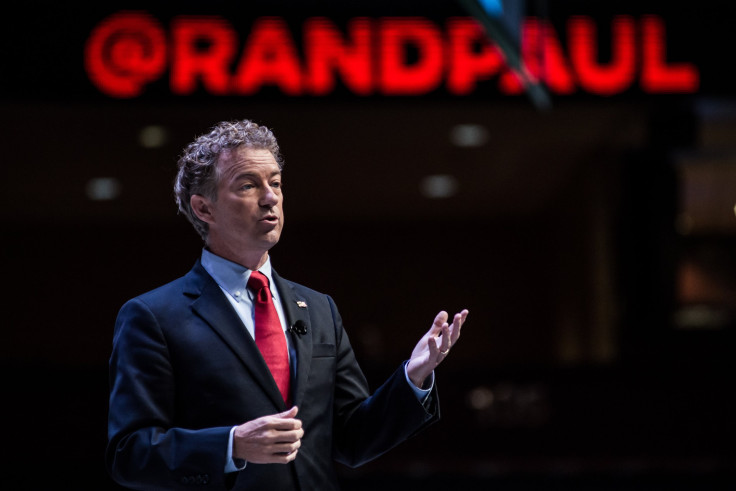Will Rand Paul's Iowa College Tour Help Him Win Over Young Voters For 2016?

Rand Paul may be currently polling seventh among GOP presidential candidates, but he's got a plan to boost his numbers: He's going to college.
The Kentucky senator recently announced he'll tour 11 Iowa campuses in three days next week, a push that has pundits speculating about whether he's trying to recapture the millennial demographic that ardently supported his father, Ron Paul, in 2012. The younger Paul likely wants to build on the good vibes his dad left behind, especially because 18- to 34-year-olds will make up about a third of the electorate by next year. But whether Rand Paul can recreate his father's success is unclear due to a crowded GOP presidential field and his moderate views that have yet to stand out.
Whereas Ron Paul was radical for railing against the establishment, Rand Paul is fighting to distinguish himself in a race focused on non-career politicians, said Kei Kawashima-Ginsberg, director of the Center for Information and Research on Civic Learning and Engagement at Tufts University in Medford, Massachusetts.
"Everyone's kind of saying 'We're going to take down Washington.' I'm not sure that's different," she said. "What is the specific brand of Rand Paul that's different from other GOP candidates?"
As of Thursday, Rand Paul had the support of 3.2 percent of likely primary voters, according to HuffPost Pollster, which combines data from several surveys. Real estate mogul Donald Trump and neurosurgeon Ben Carson topped the list, while Paul barely beat out New Jersey Gov. Chris Christie, Ohio Gov. John Kasich and former Arkansas Gov. Mike Huckabee.
Paul's Iowa campus tour is likely an attempt to drum up support ahead of the caucus there scheduled for February. The visit also comes on the heels of a "300 in 30" campaign to set up 300 campus branches between August and September. "I think that many of these kids are ready to come our way," Paul told CNN earlier this week. "Our goal is to turn 10,000 students out -- that could be enough to win the Iowa caucus. We think it's an achievable goal for us."
Ron Paul famously enchanted young voters across the country in 2012. His radical ideas made him distinct, Kawashima-Ginsberg said. He proposed cutting $1 trillion out of the country's budget and eliminating income taxes. He said Medicare and Social Security were unconstitutional. He promised to cut foreign aid.
His libertarian platform served him well. Ron Paul nabbed 47 percent of the youth vote in New Hampshire and 48 percent in Iowa.
But this time around, several people vying for the GOP nomination are extreme candidates with distinct ideas, Kawashima-Ginsberg said. College students who volunteered for Ron Paul's campaign in previous years did so because he was different. Now, "people dissatisfied with the status quo, if they're trying to change something in a radical way, people may actually choose Donald Trump," she said.
Zach Silverman, president of Students for Rand at Clemson University in Clemson, South Carolina, said he'd seen "pretty strong support" on campus for Paul so far. Although the candidate has also backed away from some of the more hardline libertarian positions his dad took, Silverman said it was probably a strategic move to try to appeal to undecided voters.
He added that many of Paul's policies were attractive to millennials, especially his efforts to protect privacy and reform the criminal justice system. Although Silverman was only 18 in 2012 and didn't follow the election closely, he said some of his older friends who had backed Ron Paul helped him get involved with his son's campaign.
"I want to see a candidate who really cares about college students -- if we end up turning out at the polls, we could decide the election," Silverman said. "With this tour in Iowa, Rand is doing that."
In that vein, Paul's campus visits could "absolutely" help him with youth voters, said Alex Smith, the national chairman of the College Republican National Committee in Washington, D.C. There are surely millennials out there who identify with GOP values but haven't turned out to vote in the past because they didn't necessarily feel connected to candidates. Paul could change this on his Iowa college tour and by continuing to beef up his social media presence, Smith said. Paul was one of the first 2016 candidates to join Snapchat and recently released an app where users can create Rand-related memes.
"Our party hasn't always been there online and on campus, so having our candidates come to those places and directly ask for their votes is something special," Smith said.
Cliff Maloney, the national youth director for Paul's campaign, said because the candidate field is so crowded, it's crucial to identify voting blocs that identify with Paul's ideas. Young adults are one of them, in part because they're the generation that will eventually have to deal with the debt the U.S. is accruing now. College and older high school students are already engaged, and the Iowa campus tour should build on that momentum, he added.
"It's not often you see a Republican exciting youth, believe me," Maloney said.
Overall, Paul wants to prove to "the Washington machine" that millennials matter, Maloney said. The campaign's goal is to reach more students than anyone else before the Iowa caucus -- and hopefully, the general election. "The establishment tends to not care about what the youth have to say," Maloney said. "We're out there to show them it's a mistake."
© Copyright IBTimes 2025. All rights reserved.






















